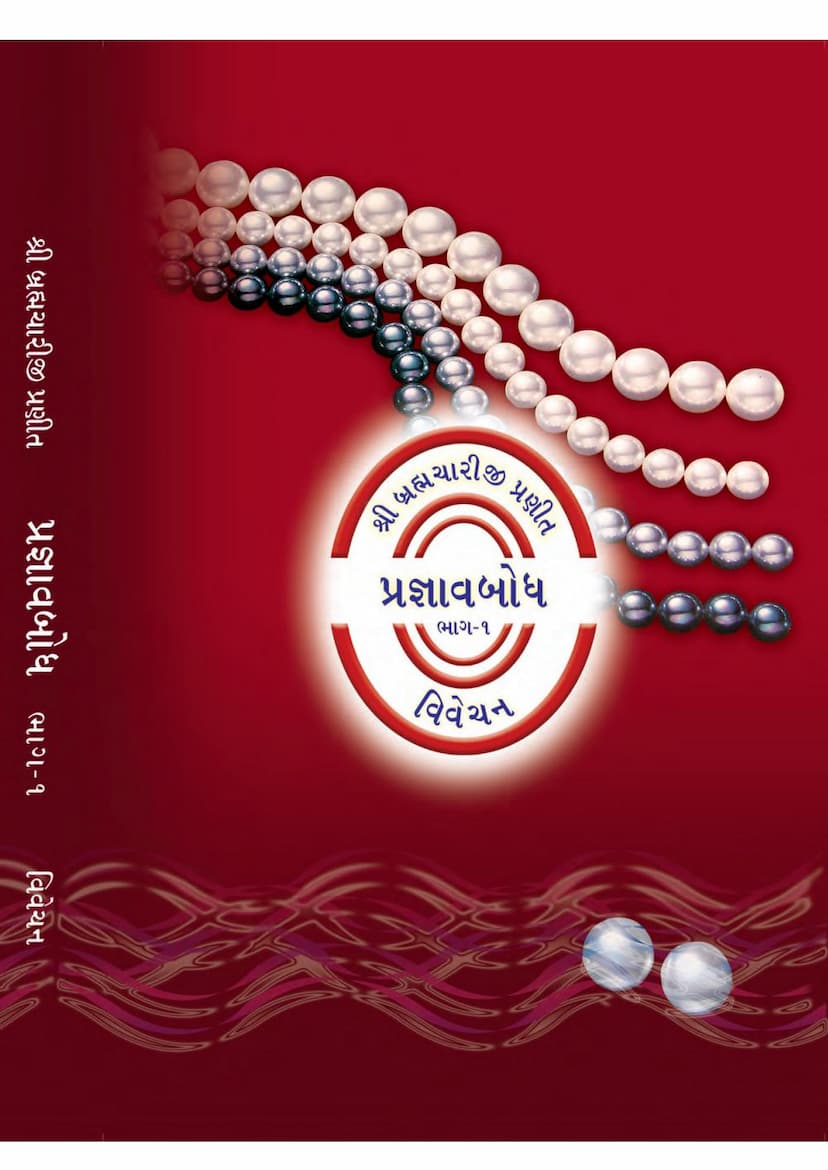Pragnav Bodh Part 01 Full Book
Added to library: September 2, 2025

Summary
Please note: The provided Jain text is in Gujarati. My response is based on translating and summarizing the content.
Pragnav Bodh Part 01: A Comprehensive Summary
Book Title: Pragnav Bodh Part 01 Full Book Author(s): Bramhachari, Paras Jain Publisher: Shrimad Rajchandra Ashram Catalog Link: https://jainqq.org/explore/009272/1
Introduction:
"Pragnav Bodh Part 01" is a profound Jain text presented as a commentary (Vivechan) on the work of Pujya Brahmachariji. It aims to elucidate the teachings of Paramkripalu Dev, Shrimad Rajchandra, and other revered Jain souls. The book is structured into various chapters (Pushpaank), each focusing on a specific spiritual or ethical concept. The commentary, compiled by Parasbhai Jain, seeks to make these profound teachings accessible through clear explanations and verse-by-verse interpretations, often accompanied by relevant citations from Shrimad Rajchandra's letters and works. The text emphasizes the importance of righteous conduct, spiritual inquiry, and devotion to attain self-realization and liberation (moksha).
Key Themes and Concepts:
The book, through its various chapters, delves into fundamental Jain philosophical and ethical principles, often drawing connections to the lives and teachings of prominent Jain figures. Here's a breakdown of the key themes:
- The Nature of Reality and the Soul: The text explores the distinction between the soul (Jiva) and non-soul (Ajiva) substances, emphasizing the soul's inherent purity and eternal nature, obscured by karmic impurities. Understanding this distinction is presented as crucial for spiritual progress.
- Righteous Conduct and Ethics: A significant portion of the book is dedicated to ethical conduct, virtue, and the eradication of vices. This includes:
- Ahimsa (Non-violence): Presented as the paramount dharma, with a strong emphasis on extending compassion to all living beings.
- Brahmacharya: The importance of celibacy and control over senses is highlighted as a path to spiritual strength and purity.
- The Five Great Vows (Panch Mahavrat): The foundational principles of Jainism are discussed in their practical application.
- Four Bhavanas (Meditative Contemplations): Maitri (friendship), Pramod (appreciation), Karuna (compassion), and Madhyastha (equanimity) are explained as essential practices for spiritual purification.
- The Importance of Renunciation: The text often contrasts worldly attachments with the higher pursuit of spiritual liberation, emphasizing the need to detach from material possessions and desires.
- The Role of the Guru and Scriptures: The profound significance of a spiritual guide (Guru) is consistently stressed as indispensable for understanding the true path to liberation. Similarly, scriptures (Agam) are presented as vital sources of knowledge and guidance, especially when studied under the tutelage of a realized soul.
- Eradication of Vices and Cultivation of Virtues: The book extensively discusses the nature of vices like anger, pride, deceit, greed, lust, jealousy, and the importance of cultivating virtues such as forgiveness, humility, honesty, contentment, self-control, and detachment.
- The Path to Liberation (Moksha): The ultimate goal of Jainism, liberation from the cycle of birth and death, is presented as attainable through persistent effort in right faith (Samyak Darshan), right knowledge (Samyak Gyan), and right conduct (Samyak Charitra). The text emphasizes self-reliance and diligent practice of these principles.
- The Life and Teachings of Bhagwan Parshvanath and Bhagwan Mahavir: The biographical accounts and spiritual messages of these revered Tirthankaras are presented as exemplary paths for spiritual aspirants. Their lives illustrate the principles of renunciation, penance, and universal compassion.
- The Nature of Karma: The intricate workings of karma and its impact on the soul's journey are alluded to, underscoring the need to purify actions and intentions to break free from karmic bondage.
- Discernment between Real and Unreal: The text encourages readers to discern between the transient nature of worldly pleasures and the eternal bliss of the soul, urging them to focus on the latter.
- The Importance of Righteous Living: The entire text acts as a guide for living a life aligned with spiritual principles, emphasizing introspection, diligent practice, and unwavering devotion.
Structure and Content:
The book is organized into 35 chapters, each marked with a "Pushpaank" number. The initial chapters focus on foundational concepts like inspiration for righteous living, praise of the Tirthankaras, and the glory of the Guru. Subsequent chapters delve into specific virtues, the nature of karma, the importance of scriptures, the detrimental effects of negligence (pramada), and the lives and teachings of Bhagwan Mahavir and Bhagwan Parshvanath. The later parts discuss the path to liberation through various spiritual practices and virtues, culminating in the ultimate goal of Moksha. The commentary provides detailed explanations, often referencing the profound insights of Shrimad Rajchandra and other Jain saints, making the abstract philosophical concepts more tangible.
Overall Message:
"Pragnav Bodh Part 01" serves as a comprehensive guide for spiritual seekers within the Jain tradition. It offers a detailed roadmap towards self-realization by systematically explaining core principles, virtues, and practices. The commentary aims to inspire readers to cultivate wisdom, detachment, and devotion, ultimately leading them towards the ultimate goal of liberation from the cycle of suffering. The emphasis on the Guru's grace and the diligent application of scripture underscores the book's practical approach to spiritual development.